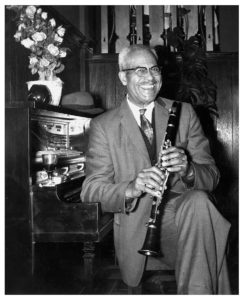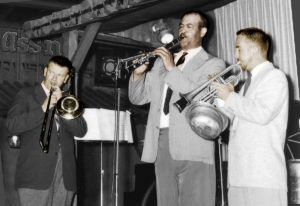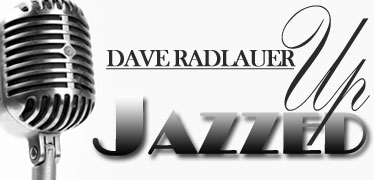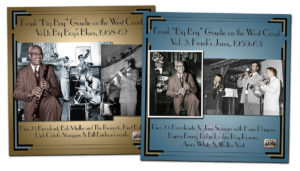
“Behind his easy smile lies one the most colorful stories in jazz.” Richard Hadlock, San Francisco Examiner, July 1963. Goudie photograph by, and copyright of William Carter, 1962.
Frank “Big Boy” Goudie (b. 1899 Louisiana – d. 1964 California) has been almost completely overlooked by jazz history, a mere footnote until recently. A skilled musician, his career paralleled the history of jazz itself: origins in Louisiana, migration to Europe, transition to Swing, integration with Latin music and the New Orleans revival.
Tall and handsome, Frank was a cultured gentleman with advanced musical skills, fluent in French and Portuguese. He was at least six feet five inches tall, probably over 250 pounds, massive, broad and powerfully built — remaining strong and fit into his sixties.
This episode celebrates his lively final chapter in San Francisco drawing from the voices of those who knew and worked with him. Playing only clarinet, Goudie’s most personal musical voice emerged in an autumnal flowering of his music.
A Big Life
Before settling in San Francisco “Big Boy” had spent three decades playing jazz, swing, dance, Latin and ethnic music on three continents. Traveling the world this master musician lived four distinct musical lives — an avatar of the jazz age:
New Orleans and the Southwest 1917-24: A journeyman jazz trumpet player by 1920, he moved to Texas and went on the road working in the Southwestern states and northeastern Mexico.
Paris and Europe 1924-39, 1946-56: For almost three decades “Big Boy” worked, recorded, played and jammed with the jazz elite of Europe — except during WW II. Arriving in Paris about the same time as Josephine Baker, he became very popular — focusing on trumpet, clarinet and tenor saxophone. Later, he easily made the transition to swing. In Europe after the war he recorded, traveled and played Jazz, Swing and Latin music, gradually building an individual New Orleans style on clarinet.
South America 1939-46: Stuck on the Southern continent during the war, Frank played Latin dance music, big band samba-swing, and jazz when he could, encouraging a nascent jazz movement. He and wife Madeleine operated a small cafe in Rio de Janeiro and traveled the region.
San Francisco 1956-64: Goudie’s expressive Creole clarinet was welcomed into the thriving second wave of the San Francisco Traditional and New Orleans jazz revival.

Note Big Boy’s height and bulk next to Mielke. The Bearcats at Pioneer Village in the East Bay with Bob Mielke (trombone) and P.T. Stanton (cornet) c. 1957.
Return to the United States
Goudie’s satisfaction with his newly adopted home was apparent in comments quoted by Hadlock for the San Francisco Examiner in July 1963:
“I had to come back to be an American again. If I had stayed away any longer I would have become another nationality. As for San Francisco, I came here once as a young boy and decided I would live in this beautify city someday. So here I am.”
Moving to San Francisco after 32 years overseas Goudie was starting over once again. In late November of 1956 he signed a union card, joining San Francisco Musicians Union Local 610, which was the African American musician’s union in a city still semi-segregated geographically into the 1960s. Black or racially integrated ensembles were more or less barred from an area east of Van Ness Avenue, encompassing the downtown hotels, North Beach and the waterfront bars – though Goudie never seems to have encountered such restrictions in practice.
“Big Boy” quickly adapted to the local Traditional, Dixieland and Revival Jazz situation. He was soon working regularly several nights a week in a trio with Burt Bales at Pier 23 on the Frisco waterfront and alternated with other clarinetists in Bob Mielke and The Bearcats Jazz Band.
In California Frank kept a proud New Orleans tradition, a trade. His business card said he was an “upholsterer” — a skill he’d practiced on the side during much of his life. His move to San Francisco was due in part to inheriting an upholstery repair shop, a minor enterprise and custom he kept. One visitor to the shop was Richard Hadlock, who describes a dimly lit location somewhat below street level that struck him as an unpromising enterprise.
In his previous career “Big Boy” had easily found well-paying gigs at prestigious venues wherever he went. But in Frisco he found no lucrative high-profile jobs. In a 1960 interview with Ken Mills he confessed to missing his former celebrity. However, he did work briefly as a substitute with noted headliners: trumpeter Marty Marsala, trombone player Kid Ory, and piano player Earl “Fatha” Hines for two weeks in 1962.
SF 1 – Intro and Joseph, Joseph.mp3
San Francisco Bay Venues
Goudie soon joined an active community of young white jazz musicians who were his junior by decades playing Dixieland and New Orleans revival four-beat jazz. As had long been his habit “Big Boy” was working almost nightly, frequently at overlapping venues including but were not limited to:
- Pier 23 jam sessions and radio broadcasts with Burt Bales, Bob Mielke, Bill Erickson and Dick Oxtot.
- He was in rotation with other clarinetists who played with Bob Mielke and The Bearcats.
- In San Francisco he was at The Bagatelle bistro on Sunday afternoons with Dick Oxtot and the usual suspects.
- In Berkeley he was a regular at the music parties, rehearsals and jam sessions at Nod’s Taproom, various Berkeley jazz houses or the home of Dick Oxtot.
- Also in Berkeley Goudie joined a remarkable swing combo at Monkey Inn with piano player Bill Erickson and trombonist Bob Mielke during 1961-62.
- In the South Bay, Goudie played with Jim Leigh in the New Orleans-styled El Dorado Jazz Band.
- (Page 1 of 4)
- Next page →



Goudie’s San Francisco music and associates may be further explored on CD and the web:
i-tunes – https://itunes.apple.com/us/artist/frank-big-boy-goudie/27045152
Frisco Jazz Archival Rarities http://www.jazzhotbigstep.com/560123.html
Frank Big Boy Goudie http://www.jazzhotbigstep.com/120601.html
Goudie in San Francisco http://www.jazzhotbigstep.com/227501.html
Bill Erickson http://www.jazzhotbigstep.com/249912.html
Dick Oxtot http://www.jazzhotbigstep.com/486423.html
Burt Bales http://www.jazzhotbigstep.com/284312.html
Janis Joplin-Dick Oxtot sessions http://www.jazzhotbigstep.com/428723.html
Pier 23 tapes http://www.jazzhotbigstep.com/295633.html
Dave-I did a 2 cd album called ‘West Coastin’ Tradjazz Productions TJP 2125. Jim Leigh’s El Dorado Jazz Band w/Frank ‘Big Boy’ Goudie ‘Live at Pete’s Chicago Club-1960. Now out of stock but I could make copies if anyone is interested.
Thanks Dick. Those are an excellent representation of Goudie playing in the prevalent New Orleans revival style.